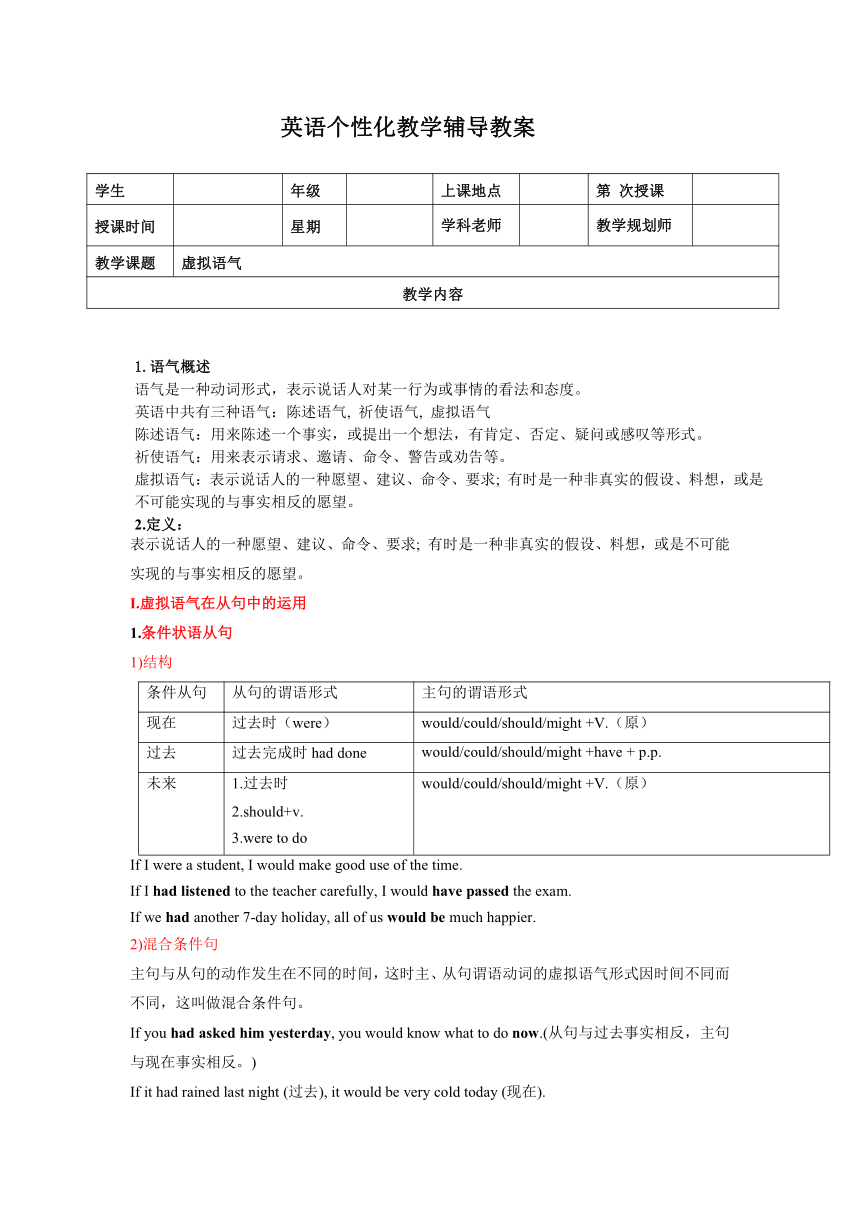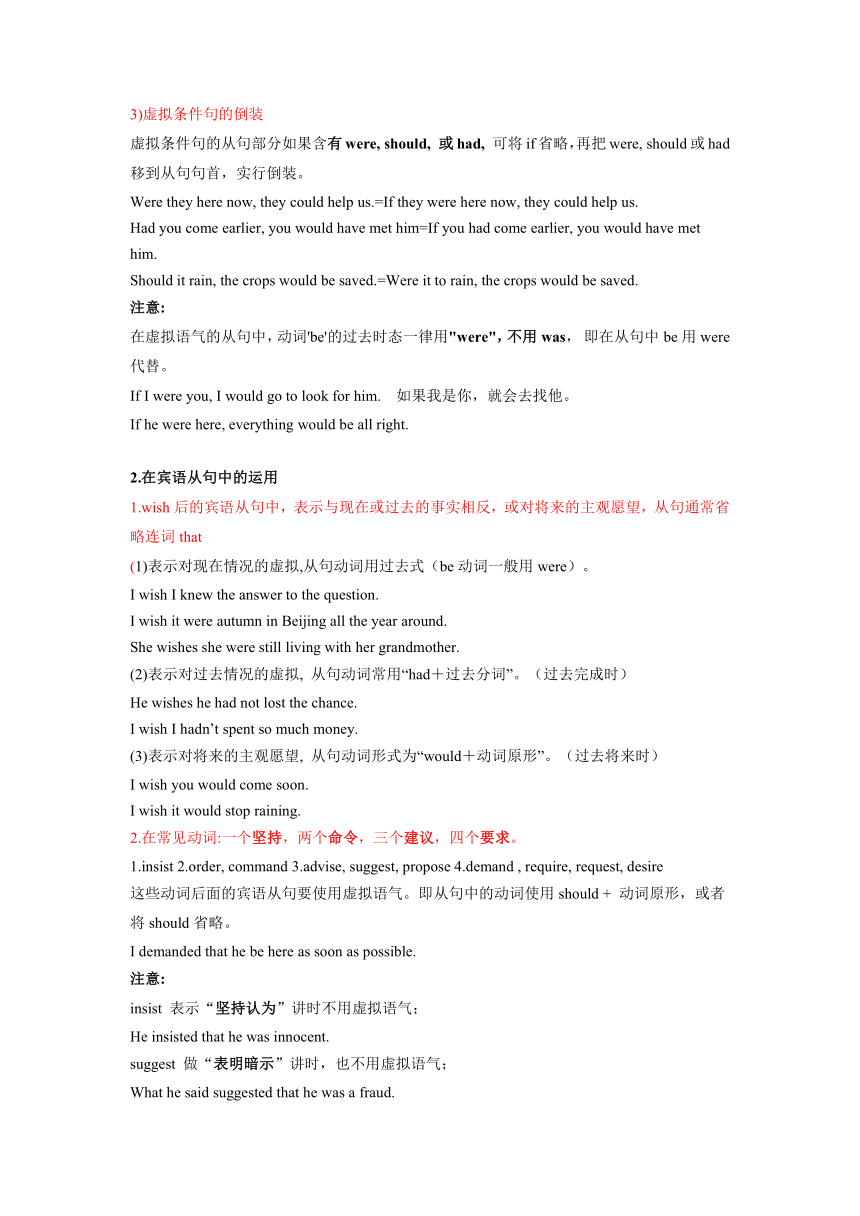2022届高中英语二轮复习语法专项第18讲虚拟语气讲义教案
文档属性
| 名称 | 2022届高中英语二轮复习语法专项第18讲虚拟语气讲义教案 |

|
|
| 格式 | zip | ||
| 文件大小 | 18.4KB | ||
| 资源类型 | 教案 | ||
| 版本资源 | 人教版(2019) | ||
| 科目 | 英语 | ||
| 更新时间 | 2022-02-04 20:12:16 | ||
图片预览


文档简介
英语个性化教学辅导教案
学生 年级 上课地点 第 次授课
授课时间 星期 学科老师 教学规划师
教学课题 虚拟语气
教学内容
1.语气概述
语气是一种动词形式,表示说话人对某一行为或事情的看法和态度。
英语中共有三种语气:陈述语气, 祈使语气, 虚拟语气
陈述语气:用来陈述一个事实,或提出一个想法,有肯定、否定、疑问或感叹等形式。
祈使语气:用来表示请求、邀请、命令、警告或劝告等。
虚拟语气:表示说话人的一种愿望、建议、命令、要求; 有时是一种非真实的假设、料想,或是不可能实现的与事实相反的愿望。
2.定义:
表示说话人的一种愿望、建议、命令、要求; 有时是一种非真实的假设、料想,或是不可能实现的与事实相反的愿望。
I.虚拟语气在从句中的运用
1.条件状语从句
1)结构
条件从句 从句的谓语形式 主句的谓语形式
现在 过去时(were) would/could/should/might +V.(原)
过去 过去完成时had done would/could/should/might +have + p.p.
未来 1.过去时
2.should+v.
3.were to do would/could/should/might +V.(原)
If I were a student, I would make good use of the time.
If I had listened to the teacher carefully, I would have passed the exam.
If we had another 7-day holiday, all of us would be much happier.
2)混合条件句
主句与从句的动作发生在不同的时间,这时主、从句谓语动词的虚拟语气形式因时间不同而不同,这叫做混合条件句。
If you had asked him yesterday, you would know what to do now.(从句与过去事实相反,主句与现在事实相反。)
If it had rained last night (过去), it would be very cold today (现在).
3)虚拟条件句的倒装
虚拟条件句的从句部分如果含有were, should, 或had, 可将if省略,再把were, should或had 移到从句句首,实行倒装。
Were they here now, they could help us.=If they were here now, they could help us.
Had you come earlier, you would have met him=If you had come earlier, you would have met him.
Should it rain, the crops would be saved.=Were it to rain, the crops would be saved.
注意:
在虚拟语气的从句中,动词'be'的过去时态一律用"were",不用was, 即在从句中be用were代替。
If I were you, I would go to look for him. 如果我是你,就会去找他。
If he were here, everything would be all right.
2.在宾语从句中的运用
1.wish后的宾语从句中,表示与现在或过去的事实相反,或对将来的主观愿望,从句通常省略连词that
(1)表示对现在情况的虚拟,从句动词用过去式(be动词一般用were)。
I wish I knew the answer to the question.
I wish it were autumn in Beijing all the year around.
She wishes she were still living with her grandmother.
(2)表示对过去情况的虚拟, 从句动词常用“had+过去分词”。(过去完成时)
He wishes he had not lost the chance.
I wish I hadn’t spent so much money.
(3)表示对将来的主观愿望, 从句动词形式为“would+动词原形”。(过去将来时)
I wish you would come soon.
I wish it would stop raining.
2.在常见动词:一个坚持,两个命令,三个建议,四个要求。
1.insist 2.order, command 3.advise, suggest, propose 4.demand , require, request, desire
这些动词后面的宾语从句要使用虚拟语气。即从句中的动词使用should + 动词原形,或者将should省略。
I demanded that he be here as soon as possible.
注意:
insist 表示“坚持认为”讲时不用虚拟语气;
He insisted that he was innocent.
suggest 做“表明暗示”讲时,也不用虚拟语气;
What he said suggested that he was a fraud.
3.would rather 后的宾语从句用虚拟语气,不同虚拟条件下,从句谓语的形式:
虚拟现在或者将来:did(be 用were)
虚拟过去:had done
I would rather you came to see me tomorrow.
I would rather you hadn’t told me the fact.
3.在主语从句中的运用
常见句型如下:
It is important / necessary / urgent / essential / + that + (should)+ 动词原形
It is sb’s order / design / suggestion / advice / + that + (should)+ 动词原形
It is suggested / advised / demanded / requested / + that + (should)+ 动词原形
It is necessary that we clean the room everyday.
It is required that middle school students (should) take one hour exercise every day.
4.在同位语中的应用
advice, suggestion, proposal, request, requirement, order, demand, desire 等表示建议、要求、命令愿望等的名词后,也要使用should 型虚拟语气,should 可以省略。
He issued the order that the troops withdraw at once.
5.在表语从句中的应用
advice, suggestion, proposal, request, requirement, order, demand, desire 等表示建议、要求、命令愿望等的名词后的表语从句,也要使用should 型虚拟语气,should 可以省略。
His suggestion is that we persuade her to stay here first.
II.虚拟语气特殊句型
1. as if /though + clause
现在:过去
过去:过去完成时
She loves the baby as if it were her own son.
I remember the whole thing as if it had happened yesterday.
注意:如果表示的事情可能会发生,那么方式状语从句中的谓语动词可用陈述语气。
2.It’s (about/high) time +that 过去时
should + v.(should 不能省略)
It is about time that we were off.我们该离开了。
It is high time that you should teach him a lesson. 你改教训一下他了。
3. without和but for构成虚拟。
but for 要不是
Without sunlight, people’s life would be different from today.
But for your help, I wouldn’t have finished the work.
4. If only后的句子通常用虚拟语气,句子谓语一般用过去时表示当前没有实现的愿望,用过去完成时表示过去没有实现的愿望。
If only I knew his name!
If only we had followed your advice!
If only I could see him again!
5.某些简单句的固定句型:
Heaven help him!
God bless you!
May you succeed!
Long live the People’s Republic of China!
6.need"不必做"和"本不该做"
didn't need to do表示:过去不必做某事, 事实上也没做。.
needn't have done表示:过去不必做某事, 但事实上做了。
John went to the station with the car to meet Mary, so she didn't need to walk back home.
John went to the station with the car to meet Mary, so she needn't have walked back home.
学生 年级 上课地点 第 次授课
授课时间 星期 学科老师 教学规划师
教学课题 虚拟语气
教学内容
1.语气概述
语气是一种动词形式,表示说话人对某一行为或事情的看法和态度。
英语中共有三种语气:陈述语气, 祈使语气, 虚拟语气
陈述语气:用来陈述一个事实,或提出一个想法,有肯定、否定、疑问或感叹等形式。
祈使语气:用来表示请求、邀请、命令、警告或劝告等。
虚拟语气:表示说话人的一种愿望、建议、命令、要求; 有时是一种非真实的假设、料想,或是不可能实现的与事实相反的愿望。
2.定义:
表示说话人的一种愿望、建议、命令、要求; 有时是一种非真实的假设、料想,或是不可能实现的与事实相反的愿望。
I.虚拟语气在从句中的运用
1.条件状语从句
1)结构
条件从句 从句的谓语形式 主句的谓语形式
现在 过去时(were) would/could/should/might +V.(原)
过去 过去完成时had done would/could/should/might +have + p.p.
未来 1.过去时
2.should+v.
3.were to do would/could/should/might +V.(原)
If I were a student, I would make good use of the time.
If I had listened to the teacher carefully, I would have passed the exam.
If we had another 7-day holiday, all of us would be much happier.
2)混合条件句
主句与从句的动作发生在不同的时间,这时主、从句谓语动词的虚拟语气形式因时间不同而不同,这叫做混合条件句。
If you had asked him yesterday, you would know what to do now.(从句与过去事实相反,主句与现在事实相反。)
If it had rained last night (过去), it would be very cold today (现在).
3)虚拟条件句的倒装
虚拟条件句的从句部分如果含有were, should, 或had, 可将if省略,再把were, should或had 移到从句句首,实行倒装。
Were they here now, they could help us.=If they were here now, they could help us.
Had you come earlier, you would have met him=If you had come earlier, you would have met him.
Should it rain, the crops would be saved.=Were it to rain, the crops would be saved.
注意:
在虚拟语气的从句中,动词'be'的过去时态一律用"were",不用was, 即在从句中be用were代替。
If I were you, I would go to look for him. 如果我是你,就会去找他。
If he were here, everything would be all right.
2.在宾语从句中的运用
1.wish后的宾语从句中,表示与现在或过去的事实相反,或对将来的主观愿望,从句通常省略连词that
(1)表示对现在情况的虚拟,从句动词用过去式(be动词一般用were)。
I wish I knew the answer to the question.
I wish it were autumn in Beijing all the year around.
She wishes she were still living with her grandmother.
(2)表示对过去情况的虚拟, 从句动词常用“had+过去分词”。(过去完成时)
He wishes he had not lost the chance.
I wish I hadn’t spent so much money.
(3)表示对将来的主观愿望, 从句动词形式为“would+动词原形”。(过去将来时)
I wish you would come soon.
I wish it would stop raining.
2.在常见动词:一个坚持,两个命令,三个建议,四个要求。
1.insist 2.order, command 3.advise, suggest, propose 4.demand , require, request, desire
这些动词后面的宾语从句要使用虚拟语气。即从句中的动词使用should + 动词原形,或者将should省略。
I demanded that he be here as soon as possible.
注意:
insist 表示“坚持认为”讲时不用虚拟语气;
He insisted that he was innocent.
suggest 做“表明暗示”讲时,也不用虚拟语气;
What he said suggested that he was a fraud.
3.would rather 后的宾语从句用虚拟语气,不同虚拟条件下,从句谓语的形式:
虚拟现在或者将来:did(be 用were)
虚拟过去:had done
I would rather you came to see me tomorrow.
I would rather you hadn’t told me the fact.
3.在主语从句中的运用
常见句型如下:
It is important / necessary / urgent / essential / + that + (should)+ 动词原形
It is sb’s order / design / suggestion / advice / + that + (should)+ 动词原形
It is suggested / advised / demanded / requested / + that + (should)+ 动词原形
It is necessary that we clean the room everyday.
It is required that middle school students (should) take one hour exercise every day.
4.在同位语中的应用
advice, suggestion, proposal, request, requirement, order, demand, desire 等表示建议、要求、命令愿望等的名词后,也要使用should 型虚拟语气,should 可以省略。
He issued the order that the troops withdraw at once.
5.在表语从句中的应用
advice, suggestion, proposal, request, requirement, order, demand, desire 等表示建议、要求、命令愿望等的名词后的表语从句,也要使用should 型虚拟语气,should 可以省略。
His suggestion is that we persuade her to stay here first.
II.虚拟语气特殊句型
1. as if /though + clause
现在:过去
过去:过去完成时
She loves the baby as if it were her own son.
I remember the whole thing as if it had happened yesterday.
注意:如果表示的事情可能会发生,那么方式状语从句中的谓语动词可用陈述语气。
2.It’s (about/high) time +that 过去时
should + v.(should 不能省略)
It is about time that we were off.我们该离开了。
It is high time that you should teach him a lesson. 你改教训一下他了。
3. without和but for构成虚拟。
but for 要不是
Without sunlight, people’s life would be different from today.
But for your help, I wouldn’t have finished the work.
4. If only后的句子通常用虚拟语气,句子谓语一般用过去时表示当前没有实现的愿望,用过去完成时表示过去没有实现的愿望。
If only I knew his name!
If only we had followed your advice!
If only I could see him again!
5.某些简单句的固定句型:
Heaven help him!
God bless you!
May you succeed!
Long live the People’s Republic of China!
6.need"不必做"和"本不该做"
didn't need to do表示:过去不必做某事, 事实上也没做。.
needn't have done表示:过去不必做某事, 但事实上做了。
John went to the station with the car to meet Mary, so she didn't need to walk back home.
John went to the station with the car to meet Mary, so she needn't have walked back home.
